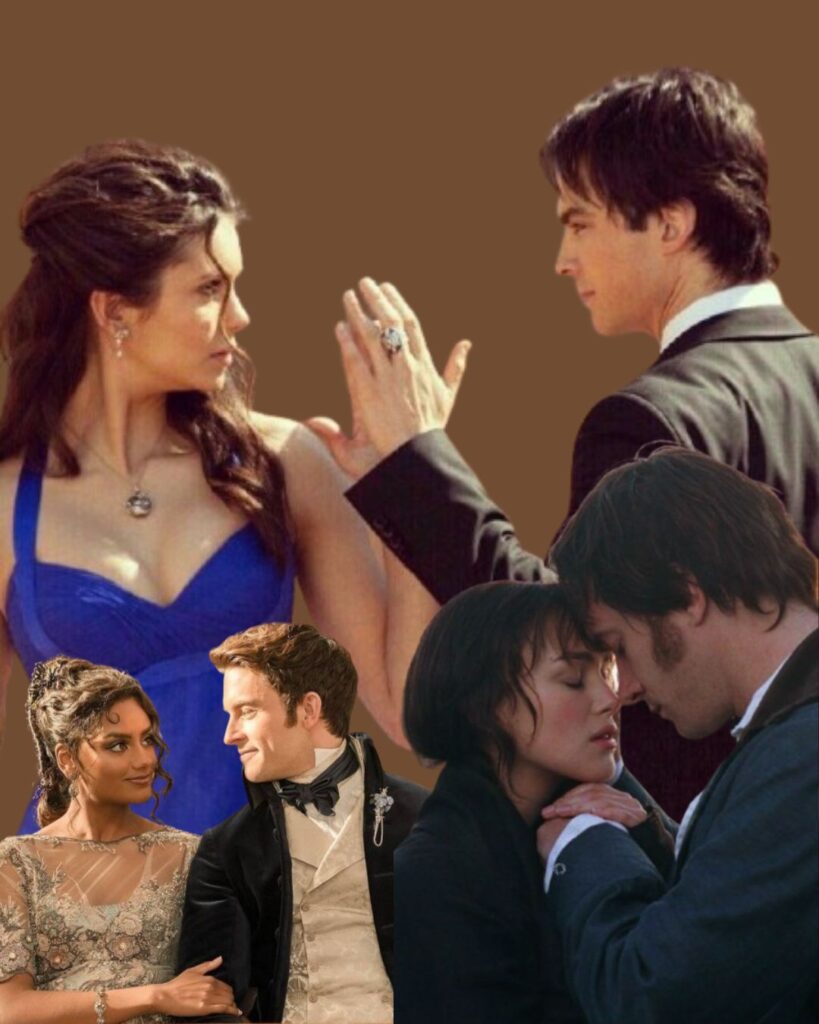Why We Love What We Love
Language and Literature have always walked hand in hand. Literature plays a major role in identification of a language thereby making it an inseparable part of it. The English language comprises a plethora of written work ranging from sonnets to ballads and plays to novels. Shakespeare’s Romeo and Juliet, Jane Austen’s Pride and Prejudice and notable tales from the Bronte sisters have all enriched the language while presenting a common theme : love.
Modern day authors like Ana Huang, Ali Hazlewood add an element of relatability to their works while still being able to blend it effortlessly with the main theme of romance. Their readers majorly include the YA – Young Adults who have hailed the Twisted series and books like The Love Hypothesis, Icebreaker as the New York Times bestsellers.
The nuances of love have reflected from the vivid ways that they have been written in cult classics and new age romance novels. From hating to loving, fake dating, billionaire romances to funnier tropes like ‘one bed only’, modern day literature encompasses a realistic reflection of the reader’s psyche.
Preferences with regards to the content one chooses to read is an invisible window to an individual’s mind, throwing a light on their personality. Having an inclination towards particular romance tropes leads to a deeper analysis of attachment patterns and types.
1. Enemies to lovers :
More often than not, this serves as the most sought after trope that depicts the transition from hate to love between two people. The sudden change from unabashedly despising someone to absolutely adoring them is as drastic and as unlikely as a sandstorm in Alaska. Stories with this as the main theme are usually packed with inexplicable tension and angst. It is also a situation which includes intense passion. People who passionately detest each other are most likely to love each other with the same amount of passion.

It is said that there is a very thin line between love and hate. The desire to be accepted with all your flaws, the fact that someone loves you despite your shortcomings is enticing. The need for constant reassurance disappears, getting replaced with the fact that someone chose you.
Dismissive Avoidant attachment enters the scenario once the characters start realizing that they have been feeling something for the opposite person that is not ‘dislike’. It is a vicious cycle of incessant denial from accepting the fact that the underlying attraction was always there. People get more defensive when it comes to their emotions and are less willing to act cordially in order to protect oneself from getting hurt / a possible rejection.
What makes it so swoon worthy is the glorified depiction in pop culture. Mr.Darcy and Elizabeth claiming to hate each other yet not being able to resist the pull in Pride and Prejudice followed by his heartfelt confession that goes like “I love you most ardently’’ sets an unrealistic expectation for the readers. Be it Damon and Elena in The Vampire Diaries or Anthony and Kate in Bridgerton, it is thrilling for the audience to live this story with them.
2. Fake Dating :

There is hardly another author like Jenny Han who has done ‘fake dating’ the right way with her To All The Boys book series that was also adapted into three blockbuster movies by Netflix. It revolved around Lara Jean and Peter Kavinsky deciding to fake date each other in order to get over and make their exes jealous respectively. What resulted ultimately was their hilariously sweet love story making them iconic forever.
We often make adjustments for our benefit albeit them being inconvenient in more ways than not. The need to fake date arises out of the absence of validation, the unspoken need to prove to someone that you can achieve a similar feat like everyone else. While showing off your partner is a rather crass way to flex, people who need that validation would do it at the cost of pretending. Majority of stories based on this theme have a common plot such as problems at the workplace / pressure to get married / making the ex jealous.
People who enjoy the fake dating trope are also found to like humour. Pretending to date someone comes with its fair share of comedic situations that put the main leads into an awkward setting and reading this adds a fun element to the story. Sense of humour is an attractive trait with many individuals seeking it in their partners.
When feelings start to get in the way of a fake relationship, an anxious attachment pattern is slightly observed within the characters of the story with them questioning the fact whether they’re enough for someone to consider making it real. They display low self esteem which readers find relatable owing to the fact that each one of us have doubted ourselves at one point in our life and continue to do so.
It is the happy discovery that the characters did ‘make it real’ which attracts the readers to this theme. The thought process being, ‘if they had this, I could have something like this too’. Fake dating is a combination of a good slow burn with forced proximity and occasional angst that makes it a reader’s paradise.
3. Billionaire Romance :
They say opposites attract. Getting to read or watch two people from completely diverse socioeconomic backgrounds fall in love with each other is like living a fantasy through a fictional medium. Stories like that of Christian Harper and Stella Alonso in Twisted Lies explore the power dynamics in a relationship where two people from varied strata coexist romantically. Christian always thought very highly of himself, exuding luxury and avoiding ‘love’ until Stella walked into his life, becoming an intense obsession.
Who doesn’t love power? The fact that a person hundred folds richer is completely smitten, having a borderline maniac obsession to the point that they can’t function in your absence is the epitome of validation for someone with naturally submissive traits. The sudden realization that you basically control that person’s life, one word and they’ll be at your mercy is empowering though in an unhealthy way. The psyche behind preferring this trope also traces to the tendency of liking domination from your partner. The rich guy being everything the timid girl tries to resist and yet she can’t help spiraling deeper into his charm.
This brings us to two important stereotypes under this theme that need to be highlighted. One being the absolutely normalized fact that it is always the man who is a billionaire and the girl is struggling to make ends meet while still ensuring that she always has a positive outlook towards life. This underplays the role of a woman’s mental health in a romance novel where she is expected to be the ‘sunshine’ in a grumpy man’s life, due to being portrayed as an unproblematic person who ‘saves’ the man’s melancholic life. For some, this ‘saviour complex’ may sound appealing but a deeper analysis reflects an unfulfilled need for constant validation making it fall under the category of anxious attachment. A troubled childhood often leads to an urge to be desired, loved and protected which is everything a ‘billionaire’ offers.
4. She fell first he fell harder :
All of us have experienced what one sided love feels like at least once in our lives. While in real life you learn to live with it, fiction tends to bring a meaningful end to that story for you.
Women have always been glorified as the ‘heartbreakers’ and men, a victim of their rejection. There are occasional instances where a woman approaches a man and he doesn’t reciprocate making the ‘she fell first, he fell harder’ trope a rarity. This slightly walks on the lines of heartbreak which is captivating enough to keep the readers engaged. It is very humane to keep expecting, keep waiting especially when in love. Hope is what makes us hold onto that last thread of endless possibilities.
The world was taken by storm in 2024 when Bridgerton Season 3 based on Julia Quinn’s Romancing Mr. Bridgerton came out. It explored the dynamics of this trope in a phenomenal way by depicting Colin and Penelope’s love story along with all the other elements like jealousy, angst and tension. Penelope was someone who had secretly been in love with Colin for years until she decided to seriously consider a proper suitor in Mr. Debling. Colin, who had always believed that their bond was purely platonic, was thrown into a frenzy of feelings as the realization of them being something more dawned upon him. When Penelope had given up all hopes of Colin being romantically interested in her, he confessed and they got a happy ending much to the fans’ delight.
The feeling that you grappled his mind to such an extent that he found it hard to resist and came back to you is again an extremely empowering validation for a woman. The initial rejection is enough to question someone’s self worth, crushing all the confidence and bringing in attachment issues. Anyone who relates to this trope has felt this way frequently, making them seek a fictional closure for what ‘it could have been’. A woman who has had a difficult childhood is likely to look at a man as means of validating her self worth.

While it is normal to seek validation, depending on a third person [in this case a man to feel good about yourself is exceedingly detrimental for one’s mental health. It may easily develop into a habit, threatening one’s independence.
Stories like these portray the man completely losing his mind after ‘the awakening’ as he pines and surprisingly ‘gets the girl’ merely on the basis of a genuinely heartfelt confession. Women have generally displayed a tendency to settle for the bare minimum making this trope more problematic than it superficially seems.
While this article made you question your sanity to some extent, it doesn’t mean you stop exploring a world of worthy books awaiting to be read.
Thanks for reading, fr! Share if you like it enough. Follow us on Instagram & LinkedIn for more.
Articulated By Saee Mhaskar, 1st year Student at Media and communication, Fergusson College.


